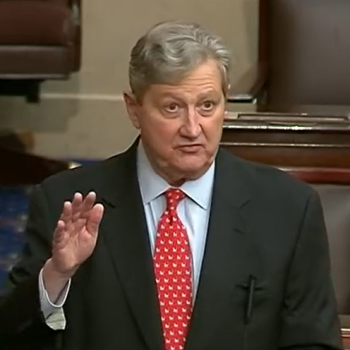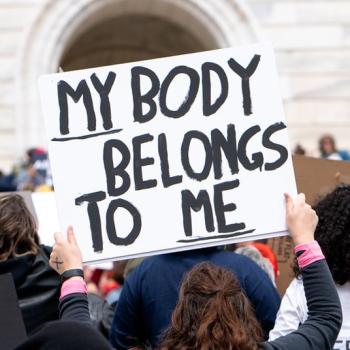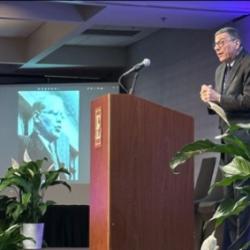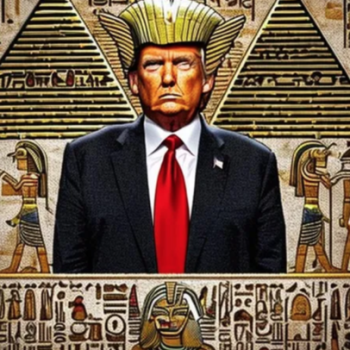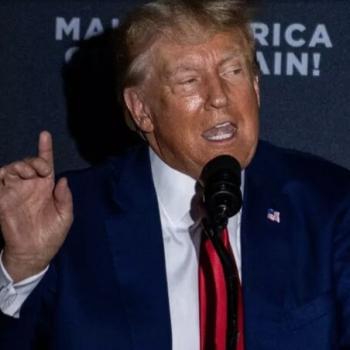Former Republican presidential candidate Mike Pence has been a curiosity from the time Donald Trump selected him as running mate in 2016, through his enormously consequential role in the January 6 electoral vote count and its aftermath, to his bumpy bid for his party’s nomination for the 2024 election. I think the entirety of Pence’s political career parallels the turbulent and deleterious course of the American evangelicalism that Pence claims as his personal faith and that he relied on throughout his career as a critically supportive constituency.
MY PASTORAL CALLS ON PENCE
During my thirty years as a minister to top elected and appointed officials in Washington, DC, I visited with innumerable members of Congress. These pastoral calls might have involved giving spiritual guidance, praying, or reading Scripture. Sometimes, I delivered a plaque of the Ten Commandments, as I did in 2006, to then Indiana Congressman Mike Pence.
One of the hats I wore in those days was as president of the National Clergy Council, a network of conservative Catholic, Evangelical, Orthodox, and Protestant church and ministry leaders. Our Indiana contingent had nominated Pence for its annual National Ten Commandments Leadership Award, recognizing “his stalwart defense of the principles espoused in the great words of Sinai.” The honor was based chiefly on his staunch opposition to legalized abortion.
Over the next few years, I would see Mr. Pence several times inside and outside the congressional building where he kept his office. But I lost touch with “Mike” (as he eventually insisted I call him) when he left Washington in 2013 to become Indiana’s 50th governor. I wouldn’t see him again until 2018 when, as then Vice President, he swore in former Kansas governor Sam Brownback as President Donald Trump’s Ambassador-at-Large for International Religious Freedom.
ADMONISHING MIKE AT THE WHITE HOUSE
In our brief encounter on that cold February day in the White House’s Eisenhower Building Indian Treaty Room, I admonished the man I now appropriately addressed as “Mr. Vice President.” Investigative journalist Tom LoBianco details what happened in his 2019 HarperCollins book, Piety and Power: Mike Pence and the Taking of the White House:
Schenck knew there was a good man tucked inside Pence’s heart, he just needed to pry him back out. Pence needed some courage, “If he could spend enough time in his interior world, I think Mike could find a conscience.” After the ceremony, Schenck walked up to his old friend and confronted him, “You know, Mr. Vice President, more than anything, we need you to find your conscience; the country desperately needs you to find your conscience.” Pence stopped smiling, he looked down at the floor, just like he used to do when the two men would pray together in his old House office, and he said, “It’s always easier said than done.” And then he walked away.
It was an uncomfortable moment for me and, apparently, even more so for the Vice President. Our exchange left me quite sad. After the otherwise joyous festivities, I concluded there were two Mike Pences–one was genuinely compassionate, caring, and even empathetic–and the other, ambitious, self-serving, and even craven.
PARALLEL PATHS
What I knew of Mike Pence’s Christian identity came from his incremental telling of his conversion story. His spiritual journey was a lot like my own, though mine had occurred several years earlier than his. The decisive moment came in 1978 as college freshman Mike stood in the rain listening to Christian folk rock musicians at an outdoor festival in Wilmore, Kentucky. The Asbury Theological Seminary was behind the event. The socially moderate evangelical school is known for its distinctly Wesleyan tradition, which includes support for the ordination of women and gender equality in church roles.
The environment in which Mike was “born again” was not yet politicized. In fact, in the late 1970s, American evangelicals in that region of the country were more likely to be Democrats than Republicans. Two years before, even the eventual Republican arch-conservative Christian television mogul Pat Robertson helped Democratic presidential candidate and fellow Southern Baptist Jimmy Carter win the White House. Mike and I supported Carter. I don’t think he was old enough to vote for the former governor of Georgia in 1976, but I was and did. We were not outliers. Carter garnered more than 50% of the evangelical vote. Bible-believing Americans admired the Southern Baptist for his humility, compassion, and simple lifestyle. But Carter would lose his reelection to Ronald Reagan. By 1980, evangelical culture was shifting dramatically–and becoming more partisan and patrician.
Though we had no contact during the early 1980s, Mike Pence and I traveled parallel paths philosophically in that time. He became a Reagan Republican at the tutelage of a history professor; I became a Reaganite at the behest of a much-admired pulpiteer, the Reverend Jerry Falwell of Lynchburg, Virginia. The Fundamentalist Falwell had enlisted thousands of young ministers like me to lead a moral reformation in America. Rev. David Wilkerson, a fire-breathing evangelist to drug addicts and gang members, had previously issued his prophecy of an America hellbent on wickedness, for which God might destroy it. On the contrary, Falwell showed us a way to prevent such a divine catastrophe: by reclaiming sexual purity, outlawing the murder of pre-born babies, and blocking homosexuals from spreading their lascivious lifestyle. Meanwhile, Mike Pence was learning that supply-side economics would assist in this social rehabilitation by putting small business owners and their families back in first position in their communities and, ultimately, the nation.
FUSION OF FAITH AND FACTIONALISM
As Mike developed his new conservative Republican business-friendly philosophy along with his budding Christian faith, I was melding a solid moral worldview with my newly discovered evangelical-friendly Reaganism. I would soon take a front seat to the political cooptation of my faith community as an evangelist while Mike launched forward as a congressional candidate. We wouldn’t meet until a few years after his long-sought 2000 win. The Pences began attending a large evangelical church near where they settled their family in the Northern Virginia outskirts of Washington. I knew that congregation and some of its pastors well, and they always spoke highly of their newest congressional member.
By the time Capitol Hill noticed Indiana Representative Mike Pence, he was the near-perfect exemplar of the conservative Christian Republican. Back in Indiana, he had been a daily three-hour afternoon radio talk show host–in keeping with the Rush Limbaugh pattern that so many marginal right-wing wanna-bees followed, but Pence was truly popular back home. He also idolized Ronald Reagan and became a staple speaker on the conservative conference circuit. Our contacts were few in those early years, but in 2008, I presented Mike with the National Ten Commandments Leadership Award in the form of that plaque, which he prominently displayed in his office. After he left Congress to become Indiana governor, a mutual friend told me Mike showcased the two tablets inscribed with his name on them in his new gubernatorial digs.
For the four years he was his home state’s chief executive, I had no contact with Mike. I did follow his career there from afar, including his successful push to pass a law protecting the rights of religious actors to refuse to do business with LGBTQ+ folks and, especially, his support for a monumental Supreme Court case that I was integrally involved in. David and Barbara Green, significant donors to my ministry at the time, owned Hobby Lobby, a national chain of retail stores. The Greens objected to the Obama-era mandate for companies to offer employees reproductive healthcare. Not only had my organization submitted a formal brief supporting their claim for a religious exception, but I had worked behind the scenes to bolster support for Hobby Lobby by the conservative justices.
Notwithstanding this goings-on, I had begun worrying about the effect of blending theology with political ideology. Historically, the church and its mission have always suffered when the state coopted religion or religion grabbed the coercive levers of the state. My very theologically conservative Bible college trained me to decry Constantine’s declaration of Christianity as the state religion and the Holy Roman Empire’s so-called “Christendom.”
NAZISM PORTENDED EMERGING CHRISTIAN NATIONALISM
During a late-in-life doctoral pursuit from 2009-12, I researched and wrote about the disastrous outcome of the successful Nazi cooptation of the German Evangelical Church. As I later watched my Christian colleagues embrace the consistently irreligious, profane, pompous, and corrupt Donald Trump in his bid for the presidency, I began pulling away from the distinct religio-political subculture Mike Pence and I had fostered for more than three decades.
It was particularly disheartening for me as Mike became an enabler of this new, reactionary, radical, and even violent revolution. When he eventually accepted Trump’s invitation to join the 2016 ticket, I was disgusted. I knew Mike’s oft-repeated affirmation, “I’m a Christian, a conservative, and a Republican, in that order,” was about to be upended. There was no way a running mate who placed his Christian convictions first could last in a contest with a vacuous antichrist like Trump.
MIKE’S DISPIRITING SPEECH
In July 2016, I sat in the stands at the Republican National Convention in Cleveland, listening to Mike’s acceptance speech. It became apparent our Ten Commandments recipient had capitulated to the same impulses overtaking the whole of American evangelicalism. The irenic and relatively reasonable conservatism of Reagan and the “compassionate conservatism” of George W. Bush, which Mike had promulgated, would be supplanted by an acidic, braggadocious, and contemptuous authoritarian style of political nihilism.
There in Cleveland, as Mike invoked the name of the paragon and patriarch of the Republican resurgence in Washington, declaring, “I signed on to the Reagan Revolution,” I heard only tepid applause and scattered cheers. But when he referred to Donald Trump as America’s only choice, I could feel the thunderous applause in the arms of my seat, which brings me to October 28, 2023.
MIKE’S REAGAN REDUX RUINED
It wasn’t surprising to me when Mike essentially ended his 2023 campaign for president, telling a group of Jewish voters, “It’s become clear to me: This is not my time.” He had, of course, lagged seriously behind in the polls for the entirety of the primary campaign. Yet, as the numbers may have been the most obvious indicator of his failure, I saw something else. In the same way, anyone trying to appeal to one-time evangelicals’ sensibilities of love for neighbor, welcoming the stranger, caring for the poor, empathizing with the lonely, and helping the marginalized would inevitably be unsuccessful today because such an ethic no longer exists in any form among Trumpian Republicans–whether they identify as “Christians” or not.
MIKE OUT OF TOUCH POLITICALLY AND PIETISTICALLY
It’s evident to me that Mike is stuck in time. He’s out of touch with what has happened to both his religious community and his conservative constituency. Mike has tried to be that “Christian, conservative, and Republican, in that order,” but today’s Republicans are neither Christian nor conservative–and they have no interest in being principled, as Mike has ostensibly been.
I’m convinced neither Ronald Reagan nor Jesus Christ would be welcome at the next Republican National Convention–no wonder Mike Pence won’t be.
(Special Note: In writing this blog, I relied heavily on my friend Tom LoBianco’s excellent analysis of Mike Pence’s personal odyssey and political career, Piety & Power: Mike Pence and the Taking of the White House, Dey St, Wm Morrow-HarperCollins 2019. I highly recommend it for much more than just the Pence story–it’s an insightful explanation of the religious, social, and political phenomena that mark our time.)





